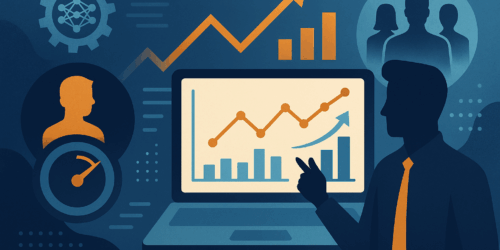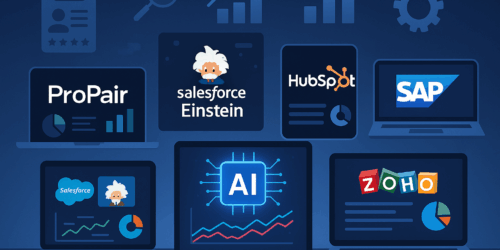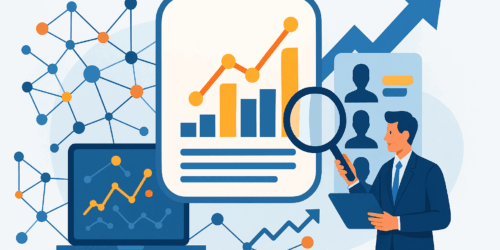What's in this article?
As we approach 2025, the growing influence of artificial intelligence in predictive sales analytics is changing the landscape of business intelligence. Sales teams are increasingly leveraging AI to hone their predictive prowess, drive efficiencies, and ultimately boost revenues. Here, we explore the top five AI tools set to transform predictive sales analytics next year, offering unique functionalities and significant advantages for forward-thinking businesses.
Emerging Trends in Predictive Sales Analytics
In 2025, predictive sales analytics tools marry machine learning capabilities with business intelligence to transform raw data into strategic insights. The integration of AI allows for more precise forecasting, helping sales teams anticipate market trends and customer behaviors with unprecedented accuracy. Key trends include the use of natural language processing (NLP) to interpret unstructured data and the employment of advanced algorithms for real-time analytics.
While AI tools have become more accessible, their complexity and efficiency in processing large datasets have exponentially improved. This advancement means businesses can now navigate massive amounts of data, identifying patterns that were previously indistinguishable and enabling data-driven decision-making.
Tool Descriptions
- ProPair AI Platform
- Overview: ProPair streamlines predictive scoring and automates lead assignments, aligning sales strategies with predictive accuracy.
- Key Features: Sophisticated lead routing, real-time performance analytics, and an intuitive dashboard that visualizes key sales metrics.
- Benefits: Sales teams experience improved lead conversion and enhanced agent performance through targeted recommendations.
- Integration Tips: Seamlessly integrates with existing CRM systems to optimize workflows without disrupting current operations.
- Overview: ProPair streamlines predictive scoring and automates lead assignments, aligning sales strategies with predictive accuracy.
- Salesforce Einstein Analytics
- Overview: Part of Salesforce’s analytics suite, Einstein leverages AI to deliver insights across a company’s sales data.
- Key Features: Robust machine learning models, predictive forecasts, and AI-powered recommendations tailored to unique business contexts.
- Benefits: Offers actionable insights that drive strategic decisions and empower sales teams with personalized next steps.
- Use Cases: Effective in industries ranging from finance to retail, providing a granular view of sales pipeline dynamics.
- Overview: Part of Salesforce’s analytics suite, Einstein leverages AI to deliver insights across a company’s sales data.
- HubSpot CRM
- Overview: While primarily known for CRM, HubSpot’s analytics capabilities have evolved to include AI-driven sales forecasts.
- Key Features: Predictive lead scoring and integrated conversational intelligence.
- Benefits: Aligns marketing and sales efforts by identifying high-value leads and opportunities faster.
- Integration Tips: Offers direct API access and third-party integrations for customizable enhancements.
- Overview: While primarily known for CRM, HubSpot’s analytics capabilities have evolved to include AI-driven sales forecasts.
- Zoho CRM Plus
- Overview: Zoho amplifies predictive sales processes with Zia, an AI assistant that bolsters CRM functionalities.
- Key Features: Anomaly detection, sales forecasting, and sentiment analysis through Zia’s unique capabilities.
- Benefits: Accelerates data-driven strategies, delivering insightful reports that optimize sales performance and strategy alignment.
- Use Cases: Ideal for small to medium enterprises aiming for scaling through AI without significant overhead.
- Overview: Zoho amplifies predictive sales processes with Zia, an AI assistant that bolsters CRM functionalities.
- SAP Sales Cloud
- Overview: Offers an advanced suite for managing sales processes infused with AI capabilities.
- Key Features: Comprehensive analytics, robust forecasting options, and a focus on customer experience through AI.
- Benefits: Enhances communication and strategy within sales teams, driving a more communicative and responsive sales approach.
- Integration Tips: Easily integrates with enterprise resource planning (ERP) systems, creating a unified data ecosystem.
- Overview: Offers an advanced suite for managing sales processes infused with AI capabilities.
Why Choose These Tools?
AI tools are not merely about integrating technology; they signify a shift in sales operations philosophy—towards precision, efficiency, and personalization. The tools discussed offer tangible benefits like improved lead management accuracy and enhanced customer interaction strategies. They demonstrate their collective ability to lift conversion rates and optimize sales performance through intelligent automation and predictive insight delivery.
FAQ
- What is predictive sales analytics?
Predictive sales analytics uses statistical algorithms and machine learning techniques to identify patterns and predict future sales outcomes from historical data. - How do predictive analytics tools improve sales forecasting?
These tools enhance forecasting by analyzing previous sales data and current market conditions to project future sales trends accurately. - Which industries benefit most from these tools?
Industries such as finance, retail, and real estate benefit significantly due to the typically large datasets and the high stakes of accurate forecasting. - What are some integration challenges with AI tools?
Common challenges include data integration with existing CRMs, alignment of AI outputs with business workflows, and the learning curve associated with new interfaces. - Why is it critical to adopt AI in sales analytics?
AI enables deep insights, faster decision-making, and improved efficiencies, which are critical in a competitive sales environment.
Transform Your Sales Strategy
Ready to integrate AI into your sales strategy? Explore how ProPair can empower your sales team with predictive analytics that deliver results. Book a demo today to see our solution in action.



